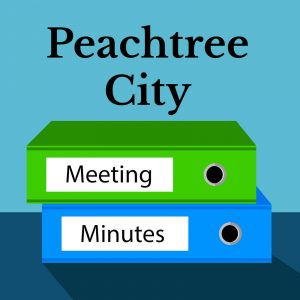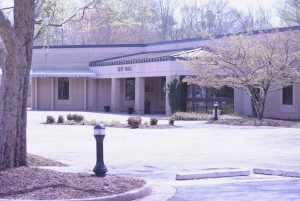Changes ahead for remaining industrial land?
Fayette County’s largest municipality will focus on redevelopment of “old” Peachtree City, from its busiest intersection eastward to City Hall, Mayor Vanessa Fleisch said in her annual State of the City address at the Jan. 4 meeting of the Peachtree City Council.
Above, Peachtree City Mayor Vanessa Fleisch, center, and Councilmen Terry Ernst (L) and Kevin Madden (R) were sworn in prior to the Jan. 4 meeting of the Peachtree City Council. For Fleisch and Ernst, it will be their second term, while Madden was seated for his first term of office. Photo/Ben Nelms.
“As a city, we need to look at the future of Highway 54 from highways 54/74 to City Hall and devise a master plan for that area to help spur redevelopment,” Fleisch said. “This idea came out of the discussions with our comprehensive plan citizen committee and our commissions and authorities. A grant application will be submitted in order to help pay for this master plan. Now is the time to look at ways to incentivize redevelopment of our residential and commercial areas.”
She also hinted that changes are afoot for the remaining industrially-zoned land in the city.
Fleisch said 80 percent of the land in Peachtree City is made up of residential real estate. Consequently, much of what is left of vacant industrial land abuts residential land, making the two not always compatible, she said.
“It would be wrong to sacrifice the quality of life of some residents in order to preserve a rather small amount of industrial land. To put it into perspective, it would take about 30,000 acres of industrial land annexed into the city in order to make the ratio of residential to industrial 50-50,” said Fleisch. “We need to be continuously looking at ways to increase the commercial side of our tax base so that we do not burden homeowners. Residential properties make up about 66 percent of our tax base while commercial properties make up 34 percent.”
Peachtree City will be competing in a new environment in the coming years and needs to stay relevant through redevelopment and possibly additional annexations, Fleisch said.
Noting the Water and Sewerage Authority (WASA), Fleisch said the council has initiated state legislation to secure that the future decision-making of Peachtree City’s sewer system resides with the City Council. She said this will also provide that the commodity of Peachtree City’s sewer capacity is appropriately allocated should the council decide to extend the system outside the city limits.
The address covered other issues like traffic and intersection improvements, future city projects and city amenities.
“Our city will continue to meet challenges head-on, instead of recoiling and kicking the can down the road, because we have a council that is willing to make the tough decisions necessary for our city,” Fleisch said. “Our citizens are telling us how important it is to them to repair our infrastructure, perhaps most vocally in the passage of the first SPLOST (special purpose local option sales tax) since 2005. The SPLOST passed by a 3-1 margin in the city and by a 2-1 margin in the county. We have already started purchasing equipment identified in the SPLOST list and some of the projects related to Lake Peachtree have been started.”
Fleisch spoke about the Lake Peachtree spillway work and planned bridge projects near the lake, such as the bridge from Drake Field to All Children’s Playground, the bridge along Ga. Highway 54, the bridge atop the new spillway and the bridge and passive park on Spyglass Island (formerly known as Snake Island).
Fleisch said SPLOST has ensured that the city will have the funds necessary to catch up on the many road and cart path paving projects.
“Last year, three miles of road were resurfaced, (and) because of the SPLOST, we anticipate repaving between 10-12 miles of road this year. While nine miles of cart path were reconstructed last year, due to the SPLOST we will be able to do an additional three miles of cart paths this year. Plus we are already constructing new paths to enhance connectivity,” Fleisch said.
The address noted the multiple traffic studies and projects, either planned or underway.
“The intersection changes to Planterra Way and Hwy. 54 which is a SPLOST project will be completed soon, as will the upgrades to MacDuff Parkway and Hwy. 54,” said Fleisch, also noting the $10 million continuous flow or displaced left-turn project which will be under construction in 2020 for the highways 54 and 74 intersection. “Another project that was completed last year was MacDuff Parkway. This road was built by the developer at a cost of nearly $8 million. The plans for the road were approved in 2007 and it was constructed per those plans. The developer has installed the traffic light at Senoia and MacDuff and it will be operational soon.”
Turning her comments to city amenities, Fleisch said the responsibility for the amphitheater was moved to the recreation and special events department which entered into a partnership for the management of the amphitheater and some city events.
“This company has contracts with other municipalities that form a collective of cities to add to our concert buying power. The amphitheater, in my opinion, has been an underutilized asset of the city. But with this new partnership, there is potential to increase the quality and quantity of concerts at the venue.”
Citing a new offering, Fleisch said the recreation department along with private individuals worked to bring the “Night Market” at Drake Field to the city.
“The journey towards improving Drake Field began in 2013 when we struggled to find the monies necessary to install utilities and other upgrades to the field,” she said. “For me, it is especially gratifying to see Drake become the park that I had hoped it could be for our city — a centralized place to have events that will strengthen our sense of community.”
Rounding out the address, Fleisch said, “We as a city have so much good news to share about all of the things that have been happening. Unfortunately, we have not been very good at effectively sharing that good news to our citizens. Over the years we have made slow deliberate strides, but this year it will be even more important to share the progress of the SPLOST projects and other events so that our citizens are continually updated.”











Leave a Comment
You must be logged in to post a comment.